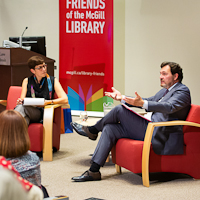Durant l’été et au début de la session, les membres du corps professoral n’ont pas chômé. De plus, nous avons eu l’honneur d’accueillir le juge Richard Wagner la conférence F.R. Scott. Voici donc à la volée, podcasts, vidéos et lettres d’opinion, articles scientifiques et interventions dans les médias.
Des robots en toges
Podcasts de la Revue de droit de McGill, 19 septembre 2019
 Le professeur Ignacio Cofone, le professeur Richard Janda et madame Petra Molnar se questionnent sur les conséquences juridiques du remplacement des décideurs humains par des systèmes d’intelligence artificielle. L’intelligence artificielle (IA) est présentement au centre d’une profonde transformation technologique. D’aucuns croient également que l’IA façonnera la façon dont nous administrons et dont nous rendons la justice en permettant l’introduction de systèmes décisionnels automatisés dans l’administration publique. Mais cela sera-t-il pour le pire ou pour le mieux, et comment s’assurer que nous introduisions et utilisions cette technologie de façon responsable ? Téléchargez le podcast.
Le professeur Ignacio Cofone, le professeur Richard Janda et madame Petra Molnar se questionnent sur les conséquences juridiques du remplacement des décideurs humains par des systèmes d’intelligence artificielle. L’intelligence artificielle (IA) est présentement au centre d’une profonde transformation technologique. D’aucuns croient également que l’IA façonnera la façon dont nous administrons et dont nous rendons la justice en permettant l’introduction de systèmes décisionnels automatisés dans l’administration publique. Mais cela sera-t-il pour le pire ou pour le mieux, et comment s’assurer que nous introduisions et utilisions cette technologie de façon responsable ? Téléchargez le podcast.
Reforming Investor-State Arbitration
CIGIonline, 18 September 2019
Professor Emeritus Armand de Mestral, BCL’66, and Postdoctoral Fellow Lukas Vanhonnaeker, LLM’15, DCL’18, recently shared findings from a questionnaire on “Reforming Investor-State #Arbitration by Recourse to the Domestic Courts of Host States,” answered in 18 countries. Read their policy brief.
Unleashing productivity growth through open science innovation
Professor Richard Gold & BCL/LLB candidate Andrew Medeiros, The Hill Times, 18 September 2019
Open science partnerships are breaking the traditional pathways of research and development. While not a panacea, they pose a unique and exciting made-in-Canada solution to our pressing productivity challenges. Read the article.
Le professeur René Provost élu membre de la Société royale du Canada
Nouvelle de la Faculté, 11 septembre 2019
 Le professeur René Provost, Ad. E., est l’un des neuf universitaires de McGill qui ont été élus membres de la Société royale du Canada membres de la SRC. Leur initiation aura lieu le 22 novembre. Lire l’annonce.
Le professeur René Provost, Ad. E., est l’un des neuf universitaires de McGill qui ont été élus membres de la Société royale du Canada membres de la SRC. Leur initiation aura lieu le 22 novembre. Lire l’annonce.
Marie Deschamps nommée à l’Office de surveillance des activités de renseignement
Journal Metro, 9 septembre 2019
L’ex juge à la Cour suprême (NDLR : et professeure auxiliaire à la Faculté de droit de McGill) Marie Deschamps, siégera désormais au nouvel Office de surveillance des activités en matière de sécurité nationale et de renseignement, a annoncé lundi le premier ministre Justin Trudeau. Elle est entrée en fonction le 30 septembre. Lire l’article.
Shauna Van Praagh and Justice Richard Wagner in conversation
 On September 9, 2019, the Friends of the McGill Library presented the 2019 F.R. Scott Lecture – a conversation between The Right Honourable Richard Wagner, P.C., Chief Justice ogf the Supreme Court of Canada, and Shauna Van Praagh, Professor of Law at McGill University.
On September 9, 2019, the Friends of the McGill Library presented the 2019 F.R. Scott Lecture – a conversation between The Right Honourable Richard Wagner, P.C., Chief Justice ogf the Supreme Court of Canada, and Shauna Van Praagh, Professor of Law at McGill University.
Some topics explored included interactions of Canadian law and contemporary society, changing roles and responsibilities of jurists and judges, future challenges for law and justice, and some levity. See the album on Facebook, and watch the lecture on YouTube.
Amid Bill 21, the dreams of Quebec’s openly religious law school students hang in the balance
Robert Leckey, The National Observer, 3 September 2019
As dean of a law school in Quebec, last week I welcomed the incoming class of new students. As I do each year, I told them it’s a wonderful moment to take up a legal education. While preparing this year’s speech, though, I had a new challenge. I had to decide how to acknowledge a new Quebec law that could deny employment to our law graduates based on religious observance.
It was in June that Quebec adopted an act respecting the laicity of the State, better known as Bill 21. The law affirms the importance of separating the state from religions. It requires public servants, and members of the public giving and receiving public services, to keep their faces uncovered. It also prohibits a long list of categories of persons from wearing religious symbols in the exercise of their functions: teachers, government lawyers, police officers and lawyers in the private sector who go to court under a government contract. Keep reading.
ILO celebrates 100 years of fighting for fair labour practices
Adelle Blackett, The Toronto Star, 2 September 2019
A good anniversary should not go to waste. Yet how many Canadians know, in this moment of inequality and discontent, that we helped found a century-old international organization whose constitution proclaims that “universal and lasting peace can be established only if it is based on social justice?”
Established under the Paris Peace Conference of 1919, the International Labour Organization outlived the beleaguered League of Nations to become the first United Nations specialized agency. Its staff barely escaped the rise of fascism in Europe, settling into a wartime home at McGill University from 1940–1948. Keep reading.
Privacy law needs privacy harm
Ignacio Cofone, The Hill, 30 August 2019
There is a persisting irony in one of privacy law’s first stories. Bodil Lindqvist was a catechist and maintenance worker in a small Swedish parish. One day, she built a website to update parishioners on the goings-on of the parish, which featured contact information about the parish’s members and informed parishioners that the priest’s availability would be limited as he had injured his foot. This turned out to be a serious mistake on Lindqvist’s part. When this seemingly innocent website came to the Swedish prosecutor’s attention, Lindqvist learned that she breached Swedish and European Union Law by processing people’s personal information without their consent. Worse, she had published sensitive, medical data (a broken foot). Keep reading.
Avoir ou ne pas avoir trois parents
Robert Leckey, Le Devoir, 27 août 2019
Selon la couverture médiatique, notre Cour d’appel vient trancher que le droit québécois ne permet pas à un enfant d’avoir trois parents. Or, qu’il soit opportun ou pas pour le Québec de suivre l’Ontario et la Colombie-Britannique en reconnaissant cette possibilité, l’espèce devant la Cour d’appel n’abordait vraiment pas cette question. Entre autres, le jugement a confirmé les effets de notre régime concernant la procréation assistée. Lire la suite.
Related coverage:
Quebec appeals court rules that children can only have two legal parents, CBC Daybreak, 21 August 2019
Can kids have three legal parents? CTV News Montreal, 20 August 2019
Taxflix and Chill
Tax, Society & Culture Blog, 22 July 2019
Intrigued by questions surrounding tax fraud, tax havens, the Panama Papers, international finance, banking and corporate tax avoidance? Following a discussion about tax documentaries on Twitter, Professor Allison Christians has compiled up a list of over 50 documentaries, dramas and propaganda clips that touch upon taxation, banking and more, many of which you can watch on YouTube. See the list.
Trois membres du corps professoral élus à l’Académie internationale de droit comparé
Nouvelles de la Faculté, 18 juillet 2019
La Faculté de droit a le plaisir d’annoncer que trois membres de son corps professoral figurent parmi les candidatures retenues aux récentes élections de l’Académie internationale de droit comparé (AIDC). La professeure Lara Khoury a été élue membre titulaire, tandis que la professeure Adelle Blackett et le professeur Vincent Forray ont été élus membres associés. Lire la suite.
Why Canadian Universities Should Get Out of the Patent Game – Richard Gold on Canada’s Failed Research Commercialization Strategy
LawBytes Podcast, 15 July 2019
 Technology transfer in the university context has emerged as significant policy issue with governments seeking to maximize the benefits of public investment in research at Canadian universities. For example, the Ford government in Ontario recently launched an expert panel on intellectual property squarely focused on the issue that speaks to maximizing commercialization opportunities with an emphasis on intellectual property. But what if maximizing commercialization opportunities does not mean prioritizing patents? Professor Richard Gold from McGill University’s Faculty of Law argues that universities should get out of the patenting game. Listen to the podcast.
Technology transfer in the university context has emerged as significant policy issue with governments seeking to maximize the benefits of public investment in research at Canadian universities. For example, the Ford government in Ontario recently launched an expert panel on intellectual property squarely focused on the issue that speaks to maximizing commercialization opportunities with an emphasis on intellectual property. But what if maximizing commercialization opportunities does not mean prioritizing patents? Professor Richard Gold from McGill University’s Faculty of Law argues that universities should get out of the patenting game. Listen to the podcast.
Une photo qui choque
Radio-Canada International, 25 juin 2019
Migrants, la photo d’une fillette et de son père noyés sème la consternation. Peut-elle faire bouger les choses aux États-Unis? Entrevue avec François Crépeau, ancien rapporteur spécial des Nations unies sur les droits de l’homme des migrants et professeur de droit international à l’Université McGill. Visionner l’entrevue.
Plus de 70 millions de déplacés et réfugiés, le point avec F. Crépeau de l’ONU
Gravel le matin, 20 juin 2019
« La migration, la mobilité humaine, ça fait partie de notre expérience humaine. » Écoutez le fil audio.
Jakub Adamski Appointed Faculty Lecturer in Legal Ethics
Faculty News, 20 June 2019
The Faculty of Law is pleased to announce that Jakub Adamski, BCL/LLB’02, has been appointed as faculty lecturer, effective June 1, 2019. He will lead the first-year Integration Weeks and Integration Workshops, as well as the upper-year Advocacy course. He will also teach other courses, including Legal Ethics and Professionalism. Read the announcement.
Opinion: The path to climate justice is intergenerational
Professor Sebastien Jodoin and BCL/LLB student Larissa Parker, Montreal Gazette, 4 June 2019
According to an Indigenous proverb, “We do not inherit the Earth from our ancestors, we borrow it from our children.” But due to global inaction on climate change, our children, grandchildren and great-grandchildren are set to live their entire lives under mounting environmental, economic and health stresses. Read more.
Media Mentions
Armand de Mestral: Nouvelle gifle pour Boris Johnson, Le Devoir, 25 septembre 2019
Robert Leckey: Untested legal options could give feds ways to intervene on Bill 21, CBC News, 22 September 2019
François Crépeau: Is Trump’s America Tougher on Asylum Than Other Western Countries?, New York Times, 14 September 2019
Jaye Ellis: Can small and medium enterprises lead the way to a sustainable future?, McGill Reporter, 12 September 2019
Daniel Weinstock: Quebec court invalidates some requirements for assisted death, Montreal Gazette, 11 September 2019
Ram Jakhu: Space: The final legal frontier, Washington Post, 31 August 2019
Robert Leckey: The changing definition of family, CBA The National, 6 August 2019
Payam Akhavan: Canadian resident escapes Iran after 11 years of detention, CBC News, 3 August 2019
Ignacio Cofone: ‘Hands are tied’: Class-action requests filed against Capital One, Montreal Gazette, 1 August 2019
Richard Janda: Should corporations be exempt from ‘cruel and unusual punishment’?, CBC Daybreak, 29 July 2019
Robert Leckey: Will federal leaders back the legal challenge to Quebec’s religious symbols ban with an election looming?, CBC News, 20 July 2019
Colleen Sheppard: As fight over Quebec’s religious symbols law shifts to courts, legal experts debate best way to challenge it, CBC News, 9 July 2019
Some recent papers
Strategic Games and Algorithmic Secrecy
Ignacio Cofone and Katherine Strandburg, McGill Law Journal, August 2019
“We challenge a claim commonly made by industry and government representatives and echoed by some academics: that algorithmic decision-making processes are better kept opaque or secret because, otherwise, decision-subjects will “game the system”, leading to inaccurate or unfair results. We show that the range of situations in which people are able to game decision-making algorithms is narrow, even when there is substantial disclosure…” Keep reading.
Algorithmic Discrimination Is an Information Problem
Ignacio Cofone, Hastings Law Journal, August 2019
While algorithmic decision-making has proven to be a challenge for traditional antidiscrimination law, there is an opportunity to regulate algorithms through the information that they are fed. But blocking information about protected categories will rarely protect these groups effectively because other information will act as proxies. To avoid disparate treatment, the protected category attributes cannot be considered; but to avoid disparate impact, they must be considered. This leads to a paradox in regulating information to prevent algorithmic discrimination. Keep reading. [.pdf]
Defiance, Defence, Repentance and What Lies Between: Assessing Defendants’ Shifting Postures Before International Criminal Tribunals
Frédéric Mégret and Marika Giles Samson, Journal of International Criminal Justice, 17 July 2019
What determines the particular postures of defendants in international criminal trials is little understood, even though it has a significant impact on the perceived legitimacy of those proceedings. After identifying three ideal-typical postures, this article focuses on observed instances of postural shifts and more subtle oscillations between them, in an effort to evaluate the extent to which such shifts can be said to result from defendants’ interaction with tribunals. While the evidence suggests that the lived experience of tribunal proceedings likely plays a role, there are several other plausible and important motivations for such shifts, each with their own distinct implications for international criminal justice. Keep reading.
The invisibility of race at the ICC: lessons from the US criminal justice system
Frédéric Mégret and Randle DeFalco, London Review of International Law, 10 June 2019
Drawing comparisons between the US criminal justice system and international criminal justice, we argue that much of the current discourse concerning the International Criminal Court’s racial politics is impoverished by being grounded in an overly thin understanding of racism that views it as wholly the product of deliberate racist acts rather than embedded in racist structures. Keep reading.
Genocide or not, do Canadians care about their Indigenous sisters?
Payam Akhavan, OpenCanada.org, 18 June 2019
“Mom, they might not look for her if we said she is Aboriginal.” Tears streamed from Kim McPherson’s eyes as she recounted the distressing conversation with her mother on April 29, 2013, when her sister Jennifer went missing. Some days later, police discovered her dismembered remains, scattered at a remote location, off the eastern coast of Vancouver Island. The cruel irony was that Jennifer McPherson’s namesake was her auntie Jennifer Johnston, who had also been murdered, in 1980. Keep reading.
